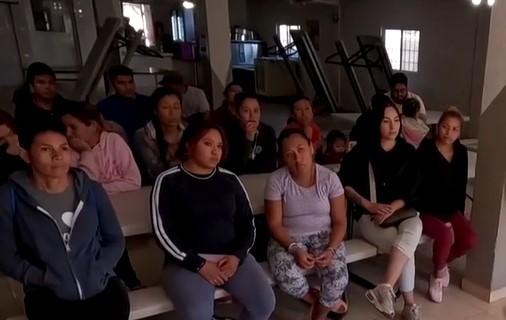CBS News
“They’re very scared”: Migrants anxiously monitor U.S. election, fearing Trump win

Nogales, Mexico — Migrants from all corners of the globe, from Latin America to far-flung countries in Africa and Asia, come to a shelter in this northern Mexican city hoping to enter the U.S. and escape economic hardship and, in some cases, deadly danger.
“They tried to kill us,” said Rosa Benalcazar, a migrant staying at the House of Mercy and all Nations, one of the biggest shelters for migrants on the Mexican side of the Arizona-Mexico border.
Benalcazar said she journeyed to the U.S. after criminal gangs threatened to harm her and her family in Ecuador, which has seen record numbers of its citizens flee amid mounting violence and insecurity.
CBS News
Like the other migrants at the shelter in Nogales, Benalcazar has been trying to get an appointment to enter America through a U.S. government phone app known as CBP One. Designed to discourage illegal border crossings, the Biden administration program allows migrants in Mexico to request a time to be processed at a legal entry point. The wait times, however, can extend for months due to an extraordinarily high demand.
“I haven’t had luck,” Benalcazar said in Spanish, noting she’s been attempting to secure a CBP One appointment each day for seven months straight.
Sister Lika Macias, the shelter’s director, said many migrants feel that luck may soon become harder to find, given the presidential election in the U.S.
“The politics in the United States,” affect “migration policy” at the U.S.-Mexico border, Macias said.
Vice President Harris has promised to continue current Biden administration policies that sharply limit asylum for those who cross the southern border without waiting for a CBP One appointment. But former President Donald Trump has vowed to seal the U.S.-Mexico border altogether, including by ending the CBP One process and other programs that allow migrants to enter the country lawfully.
“There’s a lot of concern”
On a recent morning, immigration attorney Alba Jaramillo sought to ease the confusion and anxiety among those at the shelter. The American election could go “either way” and there’s no telling who will win, she told a group of migrants, most of them mothers with children.
Jaramillo urged the migrants to be patient and to avoid listening to social media rumors about a sudden, overnight U.S. policy change.
“There’s a lot of concern about what’s going to happen,” said Jaramillo, the co-director of the Immigration Law and Justice Network, a pro-immigrant group. “They’re very scared. They think that the asylum system is going to close.”
Jaramillo said she also urged migrants to follow the legal process and refrain from crossing the U.S. border illegally with the help of smugglers. Crossing the Arizona desert, she said, is not only dangerous, and potentially deadly, but would also disqualify migrants from asylum under an executive action by President Biden in June.
After Mr. Biden enacted those broad restrictions on asylum, illegal border crossings, which had soared to record levels late last year, plunged to a 4-year low. While unauthorized crossings have remained at that low level for the past few months, U.S. officials worry the results of the presidential election could disrupt the lull.
A Trump victory, some U.S. officials believe, could prompt large numbers of migrants to try to cross into the country illegally before he takes office in January. In addition to promising to shut down the CBP One app process, Trump has vowed to reinstate his hardline immigration policies, militarize the border and oversee the largest deportation operation in American history.
“It’s nerve-racking”
Roughly half the migrants at the shelter are children, according to Macias, the facility’s director. While their parents desperately await the results of the election, fearing dramatic changes in American border policy, the kids’ only focus is being kids.
After all, for the children, there’s little to fear at the Nogales shelter, where they can learn English and mathematics and enjoy outdoor activities like soccer and basketball, as well as occasional treats.
Still, parents like Areli Doral, a young mother from Guerrero, Mexico, remain deeply concerned about what could happen following the American election.
“Yes, I’m scared,” Doral said in Spanish, while holding her two-year-old son, Edgar.
“If they close the (CBP One) application, what are we going to do? We already waited 10 months,” she said. “It’s nerve-racking.”
Doral said returning to her hometown is not an option, noting it would be dangerous for her son.
“There’s a lot of crime,” she said. “It’s become more difficult where I’m from.”
CBS News
“The Future of Money” | 60 Minutes Archive

Watch CBS News
Be the first to know
Get browser notifications for breaking news, live events, and exclusive reporting.
CBS News
60 Minutes returns to Notre Dame

Watch CBS News
Be the first to know
Get browser notifications for breaking news, live events, and exclusive reporting.
CBS News
Training AI takes heavy toll on Kenyans working for $2 an hour | 60 Minutes

Watch CBS News
Be the first to know
Get browser notifications for breaking news, live events, and exclusive reporting.









